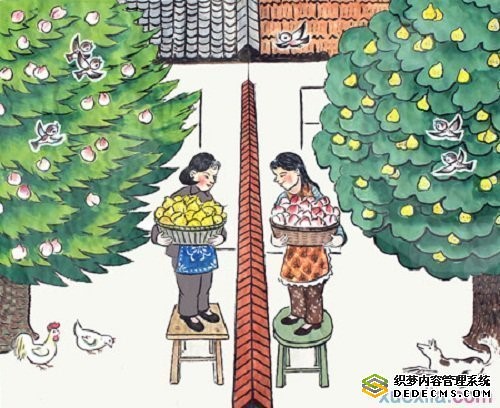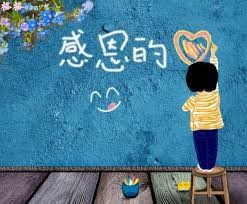On the fourth Thursday of November is Thanksgiving Day in the West that people usually express their gratitude on this day, and China also has its own “Culture of Gratitude”. Although it does not have a specific day as Thanksgiving Day, the culture of gratitude in China has a long history. Gratefulness is a Chinese virtue, as expressed by an idiom — “A drop of water in need, shall be returned with a spring in deed” since ancient times, which is important in the Chinese culture and has penetrated into all aspects of people’s daily life.

(Source: https://699pic.com/tupian/ganenjie.html)
Gratitude is the traditional virtue of the Chinese nation. Chinese culture has always valued “kindness” since ancient times. Giving and repaying kindness are universal values that China has always respected. Therefore, some expressions can be widely circulated. For example, “A drop of water in need, shall be returned with a spring in deed”, “the grace of knowledge is rewarded, the kindness is great”, “the sheep keels down when suckle from the mother and the crow knows to repay kindness by taking care of its parents”, “the father’s kindness is higher than the sky, and the mother’s kindness is deeper than the sea”. The relationship between husband and wife is also said to be the kindness of each other, so there is a saying of “A day together as husband and wife means endless devotion the rest of your life”. Thanking parents for care is called “filial piety”, Mencius said, “the most important thing of the filial piety is to respect one’s parents”; being grateful for receiving help and encouragement from someone is called “loyalty”, Sima Guang said, “to be devoted to others is loyal”; thanking friends for help is called “righteousness”, Tao Yuanming said in his poem, “Born to be brothers, there is no need to be own flesh and blood”.
The kindness praised in traditional Chinese culture is a further embodiment of the feeling of “thank you” and implements it as a concrete act of “repaying kindness.” The idiom “to repay a peach for a plum” is widely used to thank the kindness. It comes from China’s oldest collection of poems “The Book of Songs”, “You throw a peach to me, and I give you a plum in return.” It means that we always repay goodwill with greater kindness. The earliest source of “Retreat Three She to give way” was that Jin Wen Gong’s reply to King Chu Cheng’s favor when he was in exile. “Pay back one meal with one thousand gold” was Han Xin’s reward for the favor of one village woman when he was in desperation.

(Source: http://www.52daoyouci.com/know/renwu/20160928_44960.html)
Thanks for the kindness of parents and return with filial piety; thank the Lord for the encounter and return with loyalty; thank the friends and relatives, return with righteousness; thanks your husband or wife for love, return with kindness; thank the motherland and return with love. This is the culture of gratitude in China.

(Source: http://m.shouchaobao.vip/youer/2018-03-05/18324.html)
In China, there is a popular song called “Grateful Heart”, composed by Chen Zhiyuan, lyrics by Chen Lerong, and sung by singer Ouyang Feifei. It has been enduring since its release in 1982, and its melodious melody and philosophical lyrics have made it widely disseminated and even included in the textbooks of primary and secondary schools. Our life is precious and fragile, but it is not inactive. No matter where we come from and where we are going, existence is value. If we are grateful, life will be happier.
References:
[1] Yaxin, Cao. Introduction of Grace in Ancient Culture. https://www.sohu.com/a/206193430_160265
[2] Lerong, Chen. Description of the lyrics of Grateful Heart. http://fc.iwant-in.net/?p=634
[3] Introduction of the song “Grateful Heart”: https://baike.baidu.com/item/%E6%84%9F%E6%81%A9%E7%9A%84%E5%BF%83/5567
[4] Yahui, Yin. A Study of Thankful Words in Teaching Chinese as a Foreign Language. Yangzhou University. 2014(03)
[5] Yanqiong, Zhou. Research on the Speech Act of Chinese “Thanks”. Guangxi Normal University. 2007
